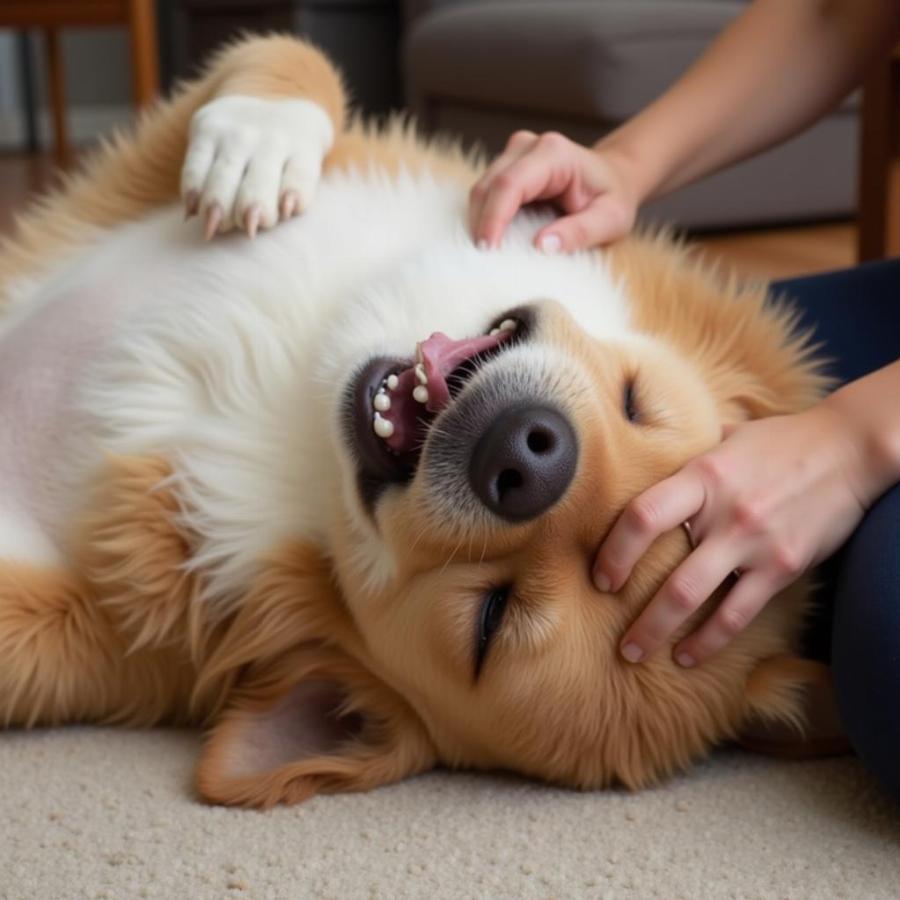Does your furry friend sometimes sound more like a farm animal than a canine companion? If you’re wondering, “why does my dog grunt like a pig,” you’re not alone. This curious behavior can range from cute little snuffles to full-blown oinks, and understanding the reasons behind it can help you better understand your dog’s needs and emotions.
Decoding Dog Grunts: What Your Dog is Trying to Tell You
Dog grunting, much like other vocalizations, can be a way for our four-legged friends to communicate a variety of emotions and physical states. While some grunts are perfectly normal and even endearing, others may signal underlying health concerns. Let’s delve into the most common reasons why your dog might be channeling their inner pig.
Contentment and Relaxation
Often, a soft grunt or snort is simply a sign of pure canine bliss. A relaxed dog, especially one enjoying a belly rub or a cozy nap, might emit low, rumbling grunts as a way of expressing contentment and pleasure. Think of it as their equivalent of a satisfied sigh.
 Chó Cảnh Grunt Thoải Mái
Chó Cảnh Grunt Thoải Mái
Excitement and Anticipation
A slightly higher-pitched grunt, often accompanied by tail wags and eager body language, can indicate excitement. Perhaps they’ve heard the jingle of their leash or the rustle of their treat bag. This type of grunt is their way of saying, “Woohoo! Something fun is about to happen!”
Communication During Play
During playful interactions with other dogs or humans, grunts can be part of the communication process. These play grunts are usually short and sharp, and often accompanied by bows and playful nips. It’s their way of saying, “Let’s play!” or “This is all in good fun!”
Pain or Discomfort
While many grunts are associated with positive emotions, it’s essential to recognize that they can also indicate pain or discomfort. If your dog is grunting more frequently than usual, particularly if accompanied by other signs like limping, whining, or changes in appetite, it’s crucial to consult a veterinarian. These grunts could be a sign of an underlying medical condition requiring attention.
Breathing Difficulties
Sometimes, grunting can be a symptom of respiratory problems. Brachycephalic breeds, such as Bulldogs and Pugs, are more prone to breathing issues due to their short noses and airways. If your dog’s grunts sound labored or if they seem to be struggling to breathe, seek immediate veterinary care.
Reverse Sneezing: A Common Culprit
One specific type of grunting that often alarms dog owners is reverse sneezing. This is a sudden, forceful inhalation that sounds like a snorting grunt or honk. While it can be startling to witness, it’s usually harmless and resolves on its own.
When to Worry: Recognizing Concerning Grunts
While most dog grunts are benign, there are instances where they warrant concern. Contact your veterinarian if your dog’s grunts:
- Are accompanied by other symptoms like lethargy, loss of appetite, or changes in behavior.
- Become increasingly frequent or intense.
- Sound labored or painful.
- Occur during or after exercise.
Understanding Your Dog’s Language
By paying close attention to your dog’s vocalizations and body language, you can gain valuable insights into their emotional and physical state. While a playful grunt can be a delightful quirk, a pained grunt warrants immediate attention.
Conclusion: Listening to Your Grunting Companion
So, the next time your dog grunts like a pig, don’t be too quick to dismiss it as mere quirkiness. By understanding the context of the grunt and observing their accompanying behavior, you can decipher its meaning and ensure your furry friend is happy, healthy, and comfortable. “Why does my dog grunt like a pig?” is a question with varied answers, and by paying attention, you’ll learn to understand your dog’s unique language.
FAQ: Frequently Asked Questions About Dog Grunting
- Is it normal for my dog to grunt while sleeping? Yes, soft grunting during sleep is often a sign of contentment and relaxation.
- Should I be concerned if my dog reverse sneezes? Reverse sneezing is usually harmless and resolves on its own. However, if it becomes frequent or prolonged, consult your vet.
- Could my dog’s grunting be a sign of a serious illness? While most grunts are benign, they can sometimes indicate underlying health issues. Consult your veterinarian if you have any concerns.
- What can I do if my dog is grunting due to pain? Do not attempt to self-treat. Seek immediate veterinary care for proper diagnosis and treatment.
- How can I tell the difference between a happy grunt and a pained grunt? Pay attention to your dog’s overall body language. Happy grunts are usually accompanied by relaxed postures and wagging tails, while pained grunts may be accompanied by whining, limping, or other signs of discomfort.
- Can training help reduce excessive grunting? If your dog is excessively vocal, consult a professional dog trainer for guidance on managing their vocalizations.
- Are certain breeds more prone to grunting? Brachycephalic breeds, like Bulldogs and Pugs, may grunt more due to their breathing anatomy.
Beaut Dogs is your ultimate resource for all things related to dog care, offering expert advice and valuable insights to help you navigate the wonderful world of dog ownership. For personalized support and answers to your specific questions, please don’t hesitate to contact us via Email at [email protected]. We’re here to help you and your furry friend thrive! Visit Beaut Dogs (https://beautdogs.com) today to discover a wealth of information and resources to enrich your dog ownership journey.